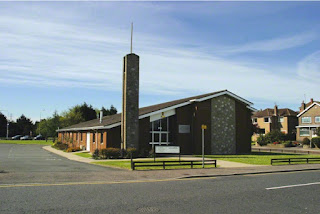 |
| No, I'm not an amazing photographer, this picture is public domain. The rest are as well. |
"What'd you do this past weekend?" you might have said.
"Oh, I went to the temple!" your Mormon friend said.
"What's a temple?" you asked.
And then your friend told you. They talked about covenants and God and maybe you even glazed over. I probably would have.
But no more! Now I've written a blog post to tell you all about it, and even if you glaze over, you can always come back and remind yourself of the details!
Mormons go to church in chapels every Sunday. A Mormon Chapel might look like this.
Church goes for three hours, split up into blocks of time. While we're there, we deliver speeches, take Sunday School, learn more about Heavenly Father and Jesus Christ and the gospel, and make covenants by taking the sacrament.
"Hold on there," you say. "You said something about covenants again. What are those, exactly?"
Covenants are promises we make to God, including promises to keep His commandments and follow His chosen prophets. To demonstrate our devotion to these covenants, we participate in activities like baptism and the sacrament (or communion).
While we go to chapels once a week as part of a congregation, we go to the temple on an individual basis, whenever we'd like. Only those who are actively keeping the covenants they made previously can attend the temple. Once we have declared ourselves covenant-keepers, we are given recommends by our leaders, and then we can enter the temple and participate in even more covenants.
"Even more covenants?" you say. "How many covenants are there?"
An active member of the LDS faith will likely be baptized, receive the gift of the Holy Ghost, receive their endowment, and be sealed to their spouse for all time and eternity. Most of these covenants are extensions of the baptismal covenant, though we take on progressively greater responsibilities with each new covenant. For example, when we receive our endowment, we promise to not only keep God's commandments, but also proactively seek to give all we have to His kingdom.
"Fascinating. I guess I understand why temples are so important."
But wait! There's more!
"There is?"
Yes! While we also make covenants for ourselves, we also redeem the dead through those same ordinances.
"For the dead? So you dig up graves or something?"
No, no, of course not. We believe that the human spirit continues to live long after the human body decays. This is further evidenced in 1 Peter 3:18-22.
"For Christ also hath once suffered for sins, the just for the unjust, that he might bring us to God, being put to death in the flesh, but quickened by the Spirit:
"By which also he went and preached unto the spirits in prison;
"Which sometime were disobedient, when once the longsuffering of God waited in the days of Noah, while the ask was a preparing, wherein few, that is, eight souls were saved by water.
"The like figure whereunto even baptism doth also now save us (not the putting away of the filth of the flesh, but the answer of a good conscience toward God,) by the resurrection of Jesus Christ:
"Who is gone into heaven, and is on the right hand of God; angels and authorities and powers being made subject unto him."
Some people, especially those outside Christian nations, never had the chance to hear the Gospel of Jesus Christ and decide for themselves if it was true (like how the verses mention those who perished in the flood of Noah). Mormons don't believe a loving God would condemn those who never had a chance to hear His servants, and so participate in baptisms for the dead, or baptisms by proxy.
Of course, this doesn't take away a dead spirit's ability to choose for themselves. If I were to get baptized in the name of a John Smith who lived back in 1913, John's spirit would have the choice to accept or reject the opportunity. When we perform a baptism for the dead, we're really just giving them the option.
I could go on, but that's why Mormons love temples. In a nutshell, they grant us opportunities to help both ourselves and our ancestors come closer to God.
Who wouldn't love that?




No comments:
Post a Comment